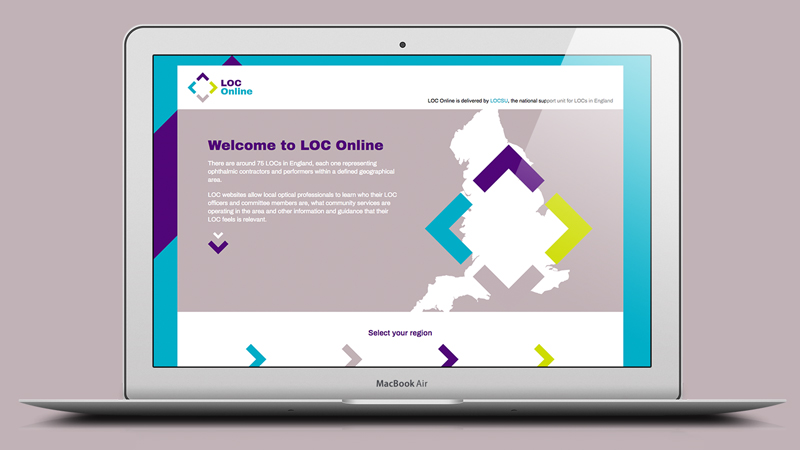LOC-online websites bring new opportunities for early adopter LOCs
12 August 2020

An important LOC role is to act as an information and communication hub for optical practice and professionals, and LOC websites are a key tool. In response to feedback gathered in focus groups and at NOC 2019, LOCSU has been working to develop and launch a new website platform for LOCs. The goal was to make websites easier for LOC members to build and update, while also allowing for automatic population of centrally generated new content from LOCSU.
A new developer partner was selected following a competitive tender and the new platform was piloted by Cheshire and Derbyshire LOCs. Following their feedback, the platform is now available to all LOCs. Now that the first new websites are going live we talked to Lisa Stonham, LOCSU’s Information Officer, who has been leading the website project, and two early adopters, to find out how the new approach is faring…
A more user-friendly interface for LOCs and audiences
One of the key benefits of the new platform is a more intuitive content management system, as Lisa explains: “The previous platform was quite difficult to use, whereas the WordPress content management system is comparatively easy. The template webpages are also structured to provide a good experience for visitors, with straightforward navigation and a clean design.”
The new platform also better supports site visitors who are using mobiles and tablets as it creates responsive sites that adapt automatically for viewing on mobile devices. This flexibility is also evident on the back-end, as Lisa explains: “Site administrators can do quick updates from their mobile – it’s no longer necessary to be using a desktop or laptop device to add news or amend pages. This makes it so much easier to keep sites updated with the latest information, even when you’re on the move.”
User guides to support LOC autonomy
When an LOC opts to switch to the new platform a template site is set up containing the main pages and forms that the LOC is likely to need. LOCs can choose style elements such as accent colours and add their own logos, so each site has its own look and feel while still remaining within the overall LOC brand. Login details for the content management system (CMS), plus a comprehensive user guide are sent to the designated person at the LOC. Guidance is included about the kind of information LOCs will need to prepare in order to populate the site.
The aim is that LOCs will be largely autonomous in populating and managing their sites, but Lisa is always on hand to help out: “Most issues can be resolved by reading the user guide,” she says, “but if anything can’t be resolved that way I can advise.” With five sites live already and a further 12 in development, it seems LOCs are forging ahead with the transition.
Berkshire LOC plans information-gathering exercise
Berkshire LOC has recently launched its new website on the LOC-online platform. LOC Secretary Sue Caskey says that populating the site was straightforward: “It all happened very quickly. Lisa sent us the login details for the template website and we had a lot of material already written, as we had been in the process of updating via the old platform. In some cases we needed to change formatting but this was easily done. It was very easy.”
Sue calculated the amount of time it took to populate the new site: “Once we knew what we needed to do and got started we totalled up the hours it took and it was about 16 overall.”
Hints and tips from the pilot LOC sites also proved useful. “The user guide suggested that we look at the Derbyshire LOC site and this was really helpful, as there were things we hadn’t considered such as privacy and cookies policies, and this gave us an idea of what they should contain.”
As well as using its website to share news and information about LOC activities, Berkshire LOC is keen to initiate interaction by using website forms to gather information from optical practices in the region to support its work with CCGs, as Sue explains: “We’re planning to create a form through which practices can submit their capabilities and expertise. This means that when we are in discussions with the CCG about commissioning new services we will have evidence of our ability to deliver them and an accurate picture of what resources are available.”
Information update opportunity seized by Birmingham LOC
At Birmingham LOC Ian Hadfield has been busy undertaking the transition to LOC-online. The decision to move was made following a Midlands LOC forum meeting: “Someone at the meeting recommended the new platform and suggested we look at the Derbyshire site so, on the basis that the new platform was set to be easier than the old to work with, we decided to make the change.”
Birmingham LOC began the process of creating up-to-date content and populating the new site in late April, and the site went live on 6thJuly. Ian slotted the work in between his other LOC secretary duties and, with help from fellow LOC member Debbie Graham, updated all the relevant sections: “We hadn’t changed the old site for some time, so we needed to update processes such as referral guidance to reflect referral by email rather than fax, for example,” says Ian. He estimates that the site population process took around ten hours altogether.
During the transition process Ian worked with the user guide and called on Lisa’s support several times: “Lisa has all the answers and sorts things out very quickly,” he notes. “Once an issue was fixed it was never a problem again.” Ian finds the new site straightforward to update and also notes that having automatically populated content direct from LOCSU helps keep it fresh.
LOCSU is encouraging LOCs to start the process of moving their websites to LOC-online. “It is much easier to use and update,” says Lisa, “and the pool of expertise in the WordPress platform is growing rapidly, so any issues can be quickly resolved.”
If your LOC would like to begin the switch to LOC-online, contact Lisa via lisastonham@locsu.co.uk

